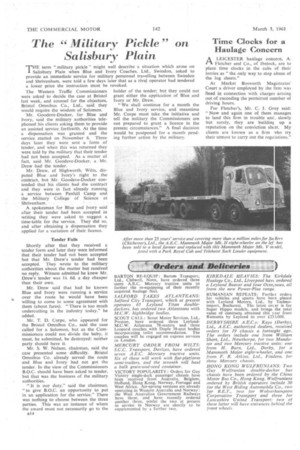The "Military Pickle" on Salisbury Plain
Page 42

If you've noticed an error in this article please click here to report it so we can fix it.
THE term "military pickle" might well describe a situation which arose on Salisbury Plain when Blue and Ivory Coaches, Ltd., Swindon, asked to provide an immediate service for military personnel travelling between Swindon and Shrivenham, were told a few days later that as a rival operator had tendered a lower price the instruction must be revoked.
The Western Traffic Commissioners were asked to decide the case at Bristol last week, and counsel for the objectors, Bristol Omnibus Co., Ltd., said they would require the wisdom of Solomon.
Mr. Goodeve-Docker, for Blue and Ivory, said the military authorities telephoned his clients asking them to provide an assisted service forthwith. At the time a dispensation was granted and the service started on November 6. Three days later they were sent a form of tender, and when this was returned they were told by the military that their tender had not been accepted. As a matter of fact, said Mr. Goodeve-Docker, a Mr. Drew had the tender.
Mr. Drew, of Highworth, Wilts, .disputed Blue and Ivory's right to the contract, but Mr. Goodeve-Docker contended' that his clients had the contract and they were in fact already running a service between Penhill Carrip and the Military College of Science at Shrivenham. • A spokesman for Blue and Ivory said after their tender had been accepted in writing they were asked to suggest a time-table for the service. They did so, and after obtaining a dispensation they applied for a variation of their licence.
Tender Fails Shortly after that they received a tender form and later they were informed that their tender had not been accepted but that Mr. Drew's tender had been accepted. They wrote to the military authorities about the matter but received no reply. Witness admitted he knew Mr. Drew's tender was IS. 6d. a day cheaper than their own.
Mr. Drew said that had he known Blue and Ivory were running a service over the route he would have been willing to come to some agreement with them (about fares). "There is too much undercutting in the industry today," he added.
Mr. T. D. Corpe, who appeared for the Bristol Omnibus Co., said the case called for a Solomon, but as the Commissioners could not divide the baby, it must, he submitted, be destroyed; neither party should have it.
Mr. S. W. Nelson, chairman, said the case presented some difficulty. Bristol Omnibus Co. already served the route and Blue and Ivory had not got the tender. In the view of the Commissioners B.O.C. should have been asked to tender, but that was the business of the military authorities.
"It is our duty," said the chairman, "to give B.O.C. an opportunity to put in an application for the service." There was nothing to choose between the three -parties. This was an instance of where the award must not necessarily go to the
B14 holder of the tender; but they could not grant either the application of Blue and Ivory or Mr. Drew.
"We shall continue for a month the Blue and Ivory service, and meantime Mr. Corpe must take the initiative and tell the military the Commissioners are not prepared to grant a licence in the present circumstances." A final decision would be postponed for a month pending further action by the military.




































































































































